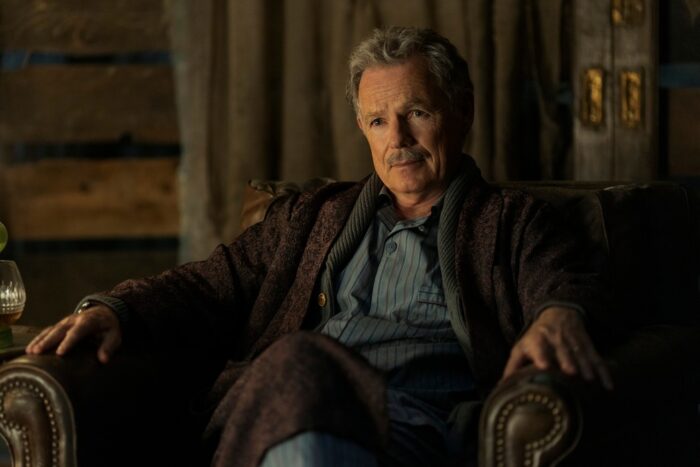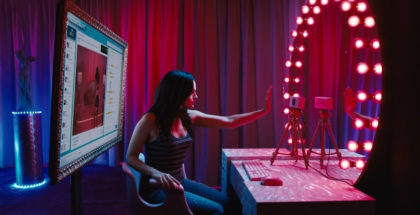The Fall of the House of Usher: A masterful tale of frightful fate
Review Overview
Cast
10Gore
8Satire
8David Farnor | On 29, Oct 2023
“You can’t eliminate pain. There’s no such thing as a painkiller.” Those are the words of Roderick Usher (Bruce Greenwood) in The Fall of the House of Usher, Mike Flanagan’s masterful tale of frightful fate – the kind that’s written by one’s own actions. Roderick is the CEO of a pharmaceutical company that has profited from years of producing Ligotone, an addictive Oxycodone-like pill. The fact that he knows it’s a hustle, to some degree, is at the heart of this horror show: over eight ominous hours, we witness the slow but inevitable consequence of a family attempting to go through life in denial of their guilt and trauma, rather than confront their horrific legacy head on.
Following Dopesick, Pain Hustlers and Painkiller, Flanagan’s series is a surprisingly timely addition to the recent spate of TV shows and films about America’s opioid crisis, but The Fall of the House of Usher succeeds by framing it through a unique lens: that of Edgar Allan Poe. The series reimagines some of Poe’s most famous stories, drawing inspiration from characters, situations and – most of all – deaths. For this is a parade of people shuffling off their mortal coil, each departure more gruesome than the last.
The result is Succession meets And Then There Were None, and Flanagan superbly balances the satisfaction of an overdue comeuppance with nasty horror, imbuing the whole eight episodes with a thrilling feeling of portent. That’s embodied by Carla Gugino as Verna, a shape-shifting figure who pops up in multiple guises and casts an ominous shadow over the proceedings.
She crosses the paths of each of Roderick’s relatives. Young Prospero Usher (Sauriyan Sapkota) leads us into a Masque of the Red Death-style party of debauchery with a preening desperation to be loved. The ruthless PR guru Camille L’Espanaye (Kate Siegel) tries to steer attention aware from the hairy happenings in the Rue Morgue. The afflicted Leo Usher (Rahul Kohli) falls foul of a Black Cat, while Victorine LeFourcade (T’Nia Miller) is at the centre of an ingenious reworking of The Tell-Tale Heart, and the entrepreneurial Tamerlane Usher (Samantha Sloyan) winds up a victim of her own image. Frederick Usher (Henry Thomas), the heir to the Fortunato company empire, sets the stage for an unexpected remix of the Pit and the Pendulum, while Crystal Balint and Mary McDonnell repeatedly steal scenes as Frederick’s tragic wife, Morella, and Roderick’s calculating sister, Madeline.
They’re all tied together by a looming sense of justice, and Gugino is clearly having a ball as the mysterious Verna, who flits between them with a ravenous glint in her eye. Her theatrical flourishes are nicely contrasted with the gravelly, grim pragmatism of Arthur Pym (Mark Hamill), another constant presence in the House of Usher – part lawyer, part fixer and, in his uniquely cynical way, the only honest one of the bunch.
Flanagan cuts between flashbacks of their various demises and a confessional chat between Roderick and Poe’s famous detective, Dupin (Carl Lumbly). That continually roots their sticky situations in the family’s inherited legacy of privilege and complicity, while giving us the maximum opportunity to savour Bruce Greenwood’s brilliant, brooding performance as the ambitious patriarch. Combined with Flanagan’s knack for drawing out poignant character beats amid practical scares, the ensemble builds into a deliciously dark compendium of grisly just desserts, powered by greed and passion. There’s no end to the pain that they have caused, individually and collectively, and The Fall of the House of Usher dissects it with killer wit. A great concept beautifully executed.



















